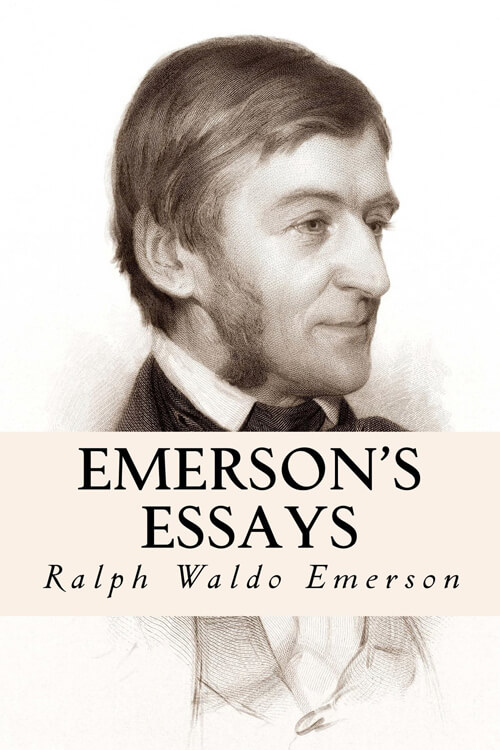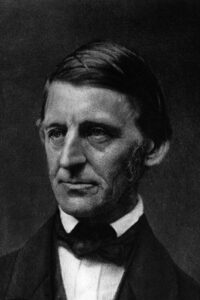
Emerson’s Essays
Whilst thus the world will be whole, and refuses to be disparted, we seek to act partially, to sunder, to appropriate; for example,—to gratify the senses, we sever the pleasure of the senses from the needs of the character. The ingenuity of man has always been dedicated to the solution of one problem,—how to detach the sensual sweet, the sensual strong, the sensual bright, etc., from the moral sweet, the moral deep, the moral fair; that is, again, to contrive to cut clean off this upper surface so thin as to leave it bottomless; to get a one end, without an other end. The soul says, Eat; the body would feast. The soul says, The man and woman shall be one flesh and one soul; the body would join the flesh only. The soul says, Have dominion over all things to the ends of virtue; the body would have the power over things to its own ends.
The soul strives amain to live and work through all things. It would be the only fact. All things shall be added unto it,—power, pleasure, knowledge, beauty. The particular man aims to be somebody; to set up for himself; to truck and higgle for a private good; and, in particulars, to ride, that he may ride; to dress, that he may be dressed; to eat, that he may eat; and to govern, that he may be seen. Men seek to be great; they would have offices, wealth, power, and fame. They think that to be great is to possess one side of nature,—the sweet, without the other side,—the bitter.
This dividing and detaching is steadily counteracted. Up to this day, it must be owned, no projector has had the smallest success. The parted water reunites behind our hand. Pleasure is taken out of pleasant things, profit out of profitable things, power out of strong things, as soon as we seek to separate them from the whole. We can no more have things and get the sensual good, by itself, than we can get an inside that shall have no outside, or a light without a shadow. “Drive out nature with a fork, she comes running back.”
Life invests itself with inevitable conditions, which the unwise seek to dodge, which one and another brags that he does not know; that they do not touch him;—but the brag is on his lips, the conditions are in his soul. If he escapes them in one part, they attack him in another more vital part. If he has escaped them in form, and in the appearance, it is because he has resisted his life, and fled from himself, and the retribution is so much death.
Read or download Book
Ralph Waldo Emerson
Ralph Waldo Emerson was born in Boston, May 25, 1803.
Biography.
He was descended from a long line of New England ministers, men of refinement and education. As a school-boy he was quiet and retiring, reading a great deal, but not paying much attention to his lessons. He entered Harvard at the early age of fourteen, but never attained a high rank there, although he took a prize for an essay on Socrates, and was made class poet after several others had declined. Next to his reserve and the faultless propriety of his conduct, his contemporaries at college seemed most impressed by the great maturity of his mind. Emerson appears never to have been really a boy. He was always serene and thoughtful, impressing all who knew him with that spirituality which was his most distinguishing characteristic.
After graduating from college he taught school for a time, and then entered the Harvard Divinity School under Dr. Channing, the great Unitarian preacher. Although he was not strong enough to attend all the lectures of the divinity course, the college authorities deemed the name Emerson sufficient passport to the ministry. He was accordingly “approbated to preach” by the Middlesex Association of Ministers on October 10, 1826. As a preacher, Emerson was interesting, though not particularly original. His talent seems to have been in giving new meaning to the old truths of religion. One of his hearers has said: “In looking back on his preaching I find he has impressed truths to which I always assented in such a manner as to make them appear new, like a clearer revelation.” Although his sermons were always couched in scriptural language, they were touched with the light of that genius which avoids the conventional and commonplace. In his other pastoral duties Emerson was not quite so successful. It is characteristic of his deep humanity and his dislike for all fuss and commonplace that he appeared to least advantage at a funeral. A connoisseur in such matters, an old sexton, once remarked that on such occasions “he did not appear at ease at all. To tell the truth, in my opinion, that young man was not born to be a minister.”
Emerson did not long remain a minister. In 1832 he preached a sermon in which he announced certain views in regard to the communion service which were disapproved by a large part of his congregation. He found it impossible to continue preaching, and, with the most friendly feelings on both sides, he parted from his congregation.
A few months later (1833) he went to Europe for a short year of travel. While abroad, he visited Walter Savage Landor, Coleridge and Wordsworth, and Thomas Carlyle. This visit to Carlyle was to both men a most interesting experience. They parted feeling that they had much intellectually in common. This belief fostered a sympathy which, by the time they had discovered how different they really were, had grown so strong a habit that they always kept up their intimacy. This year of travel opened Emerson’s eyes to many things of which he had previously been ignorant; he had profited by detachment from took a prize for an essay on Socrates, and was made class poet after several others had declined. Next to his reserve and the faultless propriety of his conduct, his contemporaries at college seemed most impressed by the great maturity of his mind. Emerson appears never to have been really a boy. He was always serene and thoughtful, impressing all who knew him with that spirituality which was his most distinguishing characteristic.
After graduating from college he taught school for a time, and then entered the Harvard Divinity School under Dr. Channing, the great Unitarian preacher. Although he was not strong enough to attend all the lectures of the divinity course, the college authorities deemed the name Emerson sufficient passport to the ministry. He was accordingly “approbated to preach” by the Middlesex Association of Ministers on October 10, 1826. As a preacher, Emerson was interesting, though not particularly original. His talent seems to have been in giving new meaning to the old truths of religion. One of his hearers has said: “In looking back on his preaching I find he has impressed truths to which I always assented in such a manner as to make them appear new, like a clearer revelation.” Although his sermons were always couched in scriptural language, they were touched with the light of that genius which avoids the conventional and commonplace. In his other pastoral duties Emerson was not quite so successful. It is characteristic of his deep humanity and his dislike for all fuss and commonplace that he appeared to least advantage at a funeral. A connoisseur in such matters, an old sexton, once remarked that on such occasions “he did not appear at ease at all. To tell the truth, in my opinion, that young man was not born to be a minister.”
Emerson did not long remain a minister. In 1832 he preached a sermon in which he announced certain views in regard to the communion service which were disapproved by a large part of his congregation. He found it impossible to continue preaching, and, with the most friendly feelings on both sides, he parted from his congregation.






